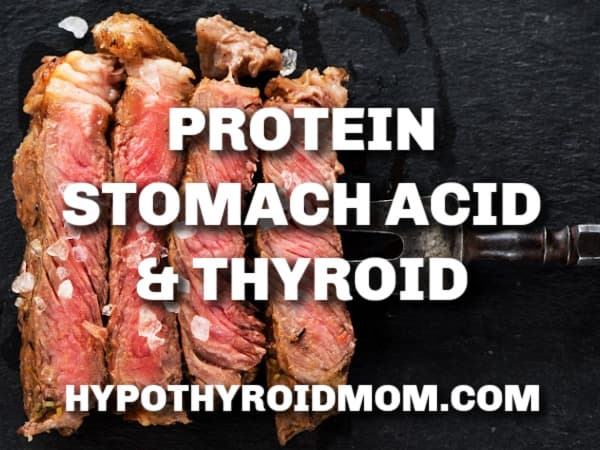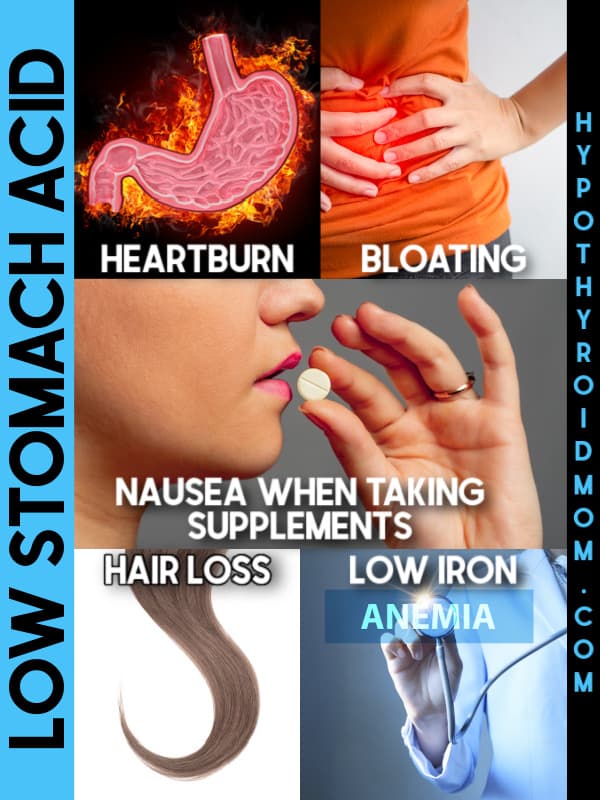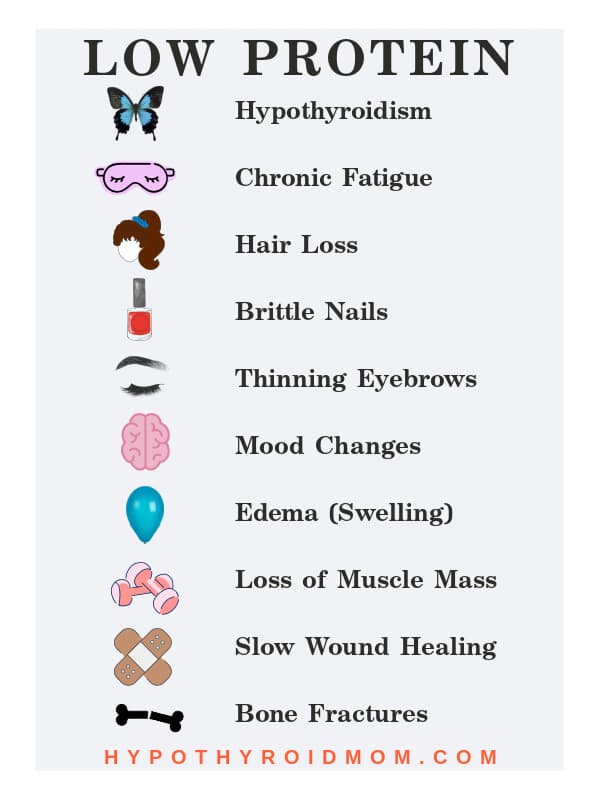Has your doctor told you that you have multiple nutrient deficiencies including low iron, low vitamin D, magnesium, and B12 but you have no idea why?
Do you struggle with uncomfortable acid reflux?
Do you take over-the-counter antacids or have you been prescribed a PPI (proton pump inhibitor)?
Do you experience indigestion and belly bloating after meals especially meals high in protein?
Does your thyroid TSH lab test come back “normal” but you feel far from normal?
Do you experience these typical signs of low stomach acid?
If you answered yes to one or more of these questions above, take a closer look at your stomach acid.
DROPPING STOMACH ACID
Dropping stomach acid is big money for pharmaceutical companies. Next time you are visiting your local drugstore, just check the antacid aisle. You’ll be shocked by just how many over-the-counter varieties are stocked on the shelves.
Proton pump inhibitors (PPIs) are one of the most commonly prescribed pharmacological groups of medicines worldwide. An increase in PPI use has been documented in many countries especially in people over age 65.[1-3] Researchers have expressed concern including risk of cognitive decline, kidney disease, liver damage, fractures and gastric neoplasia.[4-5]
A European researcher published a study with this title that says it all:[6] “WE ARE USING TOO MANY PPIs, AND WE NEED TO STOP.”
There are many names and brands of PPIs including:
- Omeprazole (Prilosec)
- Esomeprazole (Nexium)
- Lansoprazole (Prevacid)
- Rabeprazole (AcipHex)
- Pantoprazole (Protonix)
- Dexlansoprazole (Dexilant)
- Zegerid (omeprazole with sodium bicarbonate)
Check to see if you are taking any of the acid blockers on this list.
This is not to say that prescription proton pump inhibitors and over-the-counter antacid products are not helpful depending on the person’s case. This is to say to be as informed as possible. There are medical conditions like stomach ulcers and gastrointestinal bleeding when too much stomach acid is a genuine problem and lowering that acid is needed for a particular duration of time. Our bodies are all different, after all.
Stomach acid is not bad. It’s like the story of Goldilocks. You don’t want too much. You don’t want too little. You want just the right amount.
TOO LITTLE STOMACH ACID, ACTUALLY
Here’s where things get interesting. The problem may be about too little stomach acid and not about too much. Yes I know that sounds strange. If you have acid popping up in your mouth, you would think there must be too much acid down there in your stomach, but the problem may actually be that there isn’t enough stomach acid.
You will experience symptoms of heartburn if you make too much acid but also if you make too little. Weird but true.
The esophagus is the tube that food slides down from your throat to your stomach. There is a tiny trap door between the esophagus and stomach. Healthy amounts of stomach acid keeps the trap door shut so that the stomach acid stays in your stomach where it should be to digest your food. That trap door, called a sphincter, is pH sensitive and it stays shut when there is a healthy amount of acid in your stomach. If your body makes too little acid or you are taking an acid blocking medication like a PPI, your stomach pH changes and this causes that trap door to swing open, and what acid you do have in your stomach, even if it is too little, pops up into your mouth and you feel the burn.
I made stomach acid the topic of today’s article for an important reason. Here’s why.
THYROID PATIENTS NEED PROTEIN
Stomach acid is necessary for the digestion of protein into digestible amino acids that can be absorbed by the gut. The tie between protein deficiency and hypothyroidism has appeared in the scientific literature as far back as the 1970s in adults as well as children.[7] Just take a look at the list of references at the bottom of this article where I included an interesting case study reported in 1988 of a man with diabetes mellitus, chronic hepatitis, chronic pancreatitis, and blind loop syndrome but without previous thyroid disease who developed three episodes of transient primary hypothyroidism associated with protein-calorie malnutrition.[7-13] Then, full supplementation of amino acids resulted in a rapid increase in thyroid hormone levels and rapid decrease in TSH within several days after the supplementation was begun.
TSH is the main lab test taken to measure thyroid health. Did you know that in order to properly make TSH your body needs an adequate amount of protein? Yup, we need protein.
The thyroid gland combines the amino acid tyrosine to iodine to produce thyroid hormones. That amino acid tyrosine, produced by the body from another amino acid called phenylalanine, is the backbone of T4 and T3 thyroid hormones. Decreased levels of the amino acids asparagine, glutamine, serine, valine, citrulline, and arginine have all been shown to have a significant effect on thyroid parameters including TSH, T4, T3, FT4, FT3, TPOAb, and TgAb.[14]
LOW PROTEIN SIGNS
Real food is obviously the ideal way to increase your protein intake and there are plenty of non-meat food sources that are rich in protein too. There are also great tasting protein-rich supplements like these ones. If you are a coffee or tea drinker and looking for a non-diary alternative to milk to add, I like Collagen Creamer Mocha Flavor and the Vanilla Flavor. I also love the taste of this gluten, dairy, and sugar-free Paleo Protein Double Chocolate for my protein shake.
You might be eating plenty of high quality protein but you still might be protein deficient. It’s not enough to ingest protein. Your gut has to digest and absorb it across the gut lining.
MAKE EVERY MORSEL OF FOOD COUNT
If the protein you swallow doesn’t make it across the gut lining then it never reaches the bloodstream. It’s the bloodstream that carries nutrients to cells all over our body so passage across the gut lining to the bloodstream is more important than most people realize.
If you’ve just had a steak, or chicken breast, that protein needs to be chemically digested. Stomach acid, otherwise known as hydrochloric acid (HCl), stimulates the production of the digestive enzyme pepsin. Pepsin is produced in the cells of the stomach lining. Pepsin has the important job of breaking down protein into smaller size amino acids that can be easily absorbed across the gut lining of the small intestine into the bloodstream to then be carried by the blood to all the cells of the body.
If we don’t have enough stomach acid, then our stomach doesn’t have enough pepsin, so the protein we eat does not properly digest. Stomach acid also stimulates the pancreas to release digestive enzymes known as proteases which further break down protein. If you are not digesting your protein then you are not getting the amino acids that your cells need even if your diet includes a perfect balance of high quality protein.
STOMACH ACID ESSENTIAL FOR THYROID MEDICINE ABSORPTION
Gastrointestinal symptoms of hypothyroidism are numerous including low stomach acid (hypochlorhydria) and even lack of stomach acid (achlorhydria).[15] It’s a vicious cycle really because hypothyroidism can contribute to low stomach acid and low stomach acid can contribute to hypothyroidism. Finding a great thyroid doctor that gets your thyroid medication right is key.
We also need healthy levels of stomach acid to break down our thyroid hormone replacement medication and absorb it.[16] We aren’t efficiently absorbing our thyroid pills if we have low stomach acid.
This is why manufacturers of thyroid medication brands typically include warnings about antacids right in their full prescribing information. Since antacids can decrease the absorption of thyroid medication, it is advised to take thyroid medicine at least 4 hours apart from antacids. Speak to your doctor for their particular recommendations in your case.
Whenever people sign up for individual consults with me, the major reason is that they have lingering symptoms despite taking an “adequate” dosage of thyroid medicine and they want my help to locate a good thyroid doctor in their area. One common theme that I find is that malabsorption factors are overlooked. Body weight is a major factor that doctors use to calculate the right dosage for each patient but that assumes that once you take that amount of thyroid medication that it all gets absorbed across the gut lining. People with digestive issues may require higher than normal dosages of thyroid medication because of poor gut absorption. It’s the small intestine where thyroid medication is absorbed into the body and gastrointestinal disorders like chronic atrophic gastritis, gastroparesis, Helicobacter pylori infection, celiac disease, lactose intolerance, and inflammatory bowel disease have been shown to interfere with levothyroxine medication absorption.[16-18]
HOW TO INCREASE STOMACH ACID NATURALLY
LEMON WATER – One way to increase stomach acid is to drink a shot of lemon water before meals. Add the juice of half a lemon to 2-3 tablespoons of water water. You may prefer to drink a glass of lemon water but I prefer a shot size with warm or room temperature water instead to avoid the chance of diluting my body’s pre-existing stomach acid. If you think about the digestion process like a fire, a full glass of water, especially a cold glass of water, can quickly douse the flame.
APPLE CIDER VINEGAR – I take a shot of lemon water before breakfast and then these apple cider vinegar supplements before lunch and dinner. I always carry a few in my purse for whenever I eat out at a restaurant. I no longer experience the bloating and indigestion that I used to get after meals. This thyroid nutritionist explains how she uses apple cider vinegar to balance blood sugar and suppress appetite to help her hypothyroid clients lose stubborn weight.
DIGESTIVE BITTERS – Digestive bitters work too.
BETAINE HYDROCHLORIDE – Another effective way to increase stomach acid is by supplementing with hydrochloric acid. A Betaine HCL with pepsin supplement has the added benefit of including the stomach enzyme pepsin that digests protein.
CHEW EACH BITE OF FOOD – The act of chewing jumpstarts the digestive process sending a signal to the GI tract that food is coming its way and to rev up production of stomach acid and digestive enzymes in anticipation.
Sometimes the simplest things can make the biggest difference.
READ NEXT: BALANCING BLOOD SUGAR FOR THYROID HEALTH
REFERENCES:
[1] Torres-Bondia, F., et al. Evolution of the consumption trend of proton pump inhibitors in the Lleida Health Region between 2002 and 2015. BMC Public Health. 2022;22(2022):818.
[2] De la Coba Ortiz, C., et al. Proton-pump inhibitors adverse effects: A review of the evidence and position statement by the Sociedad Espanola de Patologia Digestiva. Rev. Esp. Enferm. Dig. 2016;108:207–224.
[3] Pottegard A., Broe A., Hallas J., de Muckadell O.B., Lassen A.T., Lodrup A.B. Use of proton-pump inhibitors among adults: A Danish nationwide drug utilization study. Ther. Adv. Gastroenterol. 2016;9:671–678.
[4] Fossmark, R., et al. Adverse Effects of Proton Pump Inhibitors – Evidence and Plausibility. Int J Mol Sci. 2019 Oct;20(20):5203.
[5] Zink D.A., Pohlman M., Barnes M., Cannon M.E. Long-term use of acid suppression started inappropriately during hospitalization. Aliment Pharmacol Ther. 2005;21:1203–1209.
[6] Lanas, A. We are using too many PPIs, and we need to stop: A European perspective. Am J Gastroenterol. 2016;111:1085-6.
[7] Tahara, Y., et al. Primary hypothyroidism in an adult patient with protein-calorie malnutrition: A study of its mechanism and the effect of amino acid deficiency. Metabolism Clinical and Experiemental. 1988 Jan;37(1):9-14.
[8] Rastogi, G.K., et al. Thyroid hormone levels in adult protein-calorie malnutrition (PCM). Horm Metab Res. 1974;6:528-529.
[9] Chopra, U., et al. Circulating thyroid hormones and thyrotropin in adult patients with protein-calorie malnutrition. J Clin Endocrinol Metab. 1975;40:221-227.
[10] Ingenbleek, Y., et al. Peripheral turnover of thyroxine and related parameters in infant protein-calorie malnutrition. Am J Clin Nutr. 1980;33:609-616.
[11] Onuora, C., et al. Thyroid status in various degrees of protein-calorie malnutrition in children. Clin Endocrinol. 1983;18:87-93.
[12] Ingenbleek, Y., et al. Triiodothyronine and thyroid stimulating hormone in protein-calorie malnutrition in infants. Lancet. 1975;2:845-847.
[13] Pimstone, B., et al. TSH response to synthetic thyrotropin-releasing hormone in human protein-calorie malnutrition. J Clin Endocrinol Metab. 1973;36:779-783.
[4] Krishnamurthy, H.K., et al. Effect of Micronutrients on Thyroid Parameters. J Thyroid Res. 2021;2021:1865483.
[15] Daher, R., et al. Consequences of dysthyroidism on the digestive tract and viscera. World J Gastroenterol. 2009 Jun 21;15(23):2834-2838.
[16] Virili, C., et al. Levothyroxine Therapy in Gastric Malabsorptive Disorders. Front Endocrinol (Lausanne). 2020;11:621616.
[17] Colucci, P., et al. A Review of the Pharmacokinetics of Levothyroxine for the Treatment of Hypothyroidism. Eur Endocrinol. 2013 Mar;9(1):40-47.
[18] Ruchala, M., et al. The influence of lactose intolerance and other gastro-intestinal tract disorders on L-thyroxine absorption. Endokyrnol Pol. 2012;63(4):318-23.




I have post thyroidectomy hypothyroidism I was diagnosed with papillary thyroid cancer in 1995. I’ve had two EGD’s and was diagnosed with severe gastritis, but have no symptoms I was prescribed Omeprazole 20 mg but never started it. What can I do to fix this issue, along with weight gain, hair loss, low libido. My thyroid is controlled as far as I know my endocrinologist tells me that all my symptoms are due to possible perimenopause. I’m confused and very tired of not having answers.
Thank you for this information. I have the hypothyroidism and pernicious anemia and diagnosed with gastric neuroendocrine tumors in 2006. whenever I go in for my annual gastroscope, my gastroenterologist tells me that I have acid reflux. I tell him that I do not and have only experienced acidity probably twice in my life and I’m 83 now. I do however regurgitate food at times, but it never tastes acidy. it is comforting to know that “my diagnosis” is correct.
I have Hashimoto and this rime around cant stop my hair from falling out. What should I be testing for? Frustrated
I had gastric bypass (Roux-N-Y) surgery. November 2022 and I have hypothyroidism (diagnosed back in 2012). I’ve been taking natural thyroid Rx’s and am currently taking Thyroid Porcine 57 mg. I am wondering if it’s even being absorbed through my small intestines and even reaching my thyroid and if not, what can I do about it. I’m so tired all the time and I’m trying to get enough protein including collegin powder.
Becky, We’re all different and what amount of medication that is best for our bodies is individual but to give you a sense of the average amount that my Hypothyroid Mom followers tell me is ideal for them according to surveys that I’ve conducted over the years, most people need 2 to 3 grains of natural desiccated thyroid to be optimal. One grain equals 60 mg so that would be a total dose of 120 to 180 mg. I personally feel my best at 150 to 180. Get a second medical opinion about your thyroid treatment. If you struggle to find a good doctor, consider booking a thyroid consult with me. Over my ten years as Hypothyroid Mom, I’ve been collecting the names of thyroid doctors and compiling them by region based on recommendations from my followers. I’ve done this for ten years because I know that the hardest part is finding a good thyroid doctor. I have extensive doctor lists for every state that are a good blend of both private doctors as well as doctors that take insurance. I provide every person that I meet for a consult with a list of doctors for their area. Here is my booking calendar: https://ny786.infusionsoft.app/app/orderForms/Talk-with-Dana-Trentini-30min
So in my case I have a underacting thyroid and am taking 125mcg of Synthroid. However I have a lot of stomach acid to the point my GI wants me to take Prilosec. What do you advise?
Hi Minette, As I’m not a doctor I always tell people to follow the advice given by your doctor however it is always a good idea to get a second medical opinion just to be sure you hear other points of view. If low thyroid is the underlying cause of the low stomach acid, for example, the acid reflux might be a sign that your thyroid treatment is not optimal. Here in this article you’ll find the 6 key thyroid lab tests to request be run for you: https://hypothyroidmom.com/hypothyroid-testing-what-you-need-to-know-and-ask-for/
Hi! I’m so confused. 😫 My kidney stone doctor told me to cut down my protein intake. Also, I had an upper GI along with my colonoscopy and was told my stomach is full of polyps, but my colon had done. I also have Diverticulosis. Have had Diverticulitis too. I don’t know what to eat anymore. I throw up sometimes if I eat steak. I can’t even swallow it. Help! Im also Hypothyroid.
Hi Diane, It’s not easy to figure out what to eat especially when we have conditions like diverticulitis and diverticulosis that make eating certain foods more challenging. I know. for example, that nuts and seeds are not recommended for diverticulosis because they can get stuck in the small pouches, diverticula, in the lining of the intestine in those conditions. Go back to your doctor and ask them what foods you should eat with those conditions and what forms of protein are ideal. There are non-meat foods that are high in protein too. There are also protein-based supplements. Consider meeting with a dietician who can advise you on what to eat with meal plans. It’s good to have you at Hypothyroid Mom.
Hello Diane, I too have had both upper and Colonoscopies last year. the Dr said I have ulcers in stomach and he increased my stomach pill: Omeprazole from 20mg to 40 mgs; said it would/should heal my stomach. IDK yet. plus I have some diverticulitis too. I too have many small kidney stones in both kidneys for years! Calcified stones… My diet recommendations conflict also, so I do the best I can … Good luck! lady from usa